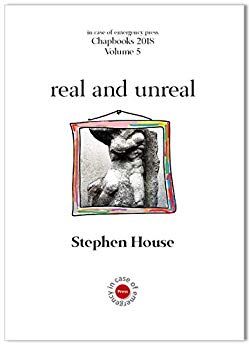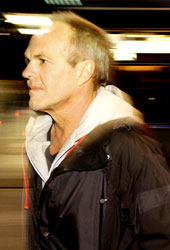Source: The Conversation (Au and NZ) – By Corinna Di Niro, Lecturer/Creative Arts Researcher and TEDx Speaker, University of South Australia
Why do we tell stories, and how are they crafted? In this series, we unpick the work of the writer on both page and screen.
Adelaide-born, award-winning playwright Stephen House has created many plays, exhibitions and short films. He usually directs and performs his work. Although writing poetry came to him early, he has only recently, in middle age, compiled his best poems in his first collection, real and unreal (2018).

In it he offers a unique journey into worlds and ways that are not often written about. Self identifying as a “queer-nomad”, House describes himself as “definitely not straight”.
While real and unreal doesn’t set out to shock, it deliberately opens doors that are mostly left closed. The poems are frank in their exploration of male queerness and raise social justice issues: the plight of the underclass (as House calls it), and the effects of homophobia, domestic violence, abuse, exploitation, sex work, poverty and discrimination.
Take his poem “who we are”, for instance:a young man and woman jog together towards us
pass us at the water’s edge
fucking faggots he sniggers
disgusting she adds
they keep running on their wayhe lets go of my hand
it hurts
more than their abuse did
An observational tone
The collection has an observational tone. There is often a sense House is on the outside looking in. He shares the world in which he lives matter-of-factly, whether it be chaotic, calm or an adventure down a dark alleyway.
House left school at 15, worked in a factory and then travelled around for years living in the back of a car, doing odd jobs and working for short stints.
he lives in an ragged tent amongst coastal gums i sleep in an old car moulded into sand-hill bush
i cry
i’m not sure whyat my camp i make a driftwood fire
cook my food
warm my bodywrite a poem
about a driftwood mountain that changed my life
(excerpt from “driftwood mountain”).

While forging a career as a playwright for 20 or so years, House was also writing and performing monologues. Although he hasn’t dropped theatre completely, he now tends to write poetry because of his growing fascination with glimpses of situations rather than full stories, and because poetry fits in better with life on the road.
alone
with nature
and selffinally free
from where I was
before
(excerpt from the poem “self”).

House’s poems usually begin with an idea that grows as he wanders along, taking in the environment around him. From there the scrawling starts; dot points and scribbles in a cafe or bar, alone. Then a process of refinement until the piece tells him it’s finished.
He steers away from traditional forms of poetry, avoiding typical poetic conventions and rhyme unless it occurs naturally in sections. Just as he takes risks in life, he does so in his work: blurring forms and often swaying into prose poetry.
once I think
maybe twicei’m not sure where and when
i order a long black
he looks at me
man on man gaze
(Excerpt from the poem “where and when”).
Despite limited education or knowledge of literature, House has developed a unique, succinct voice. There is no single rhythm and no one structure in his work. The vivid world in which he lives and its translation into poetry is based on a flow of consciousness – and he works until, as he puts it, he knows it feels right.
A spontaneous method
His method is never the same – like his life, it is spontaneous. In the poem “when i write”, House opens up about his habits and thoughts on writing.
Real work occurs in a kind of way that is sober and steady.
Though still unmeasured and unplanned,
it has the comforting foundation of safe and calm.Drinking writing never comes under the title
of writing properly; though I got that bizarre piece
(about my appalling behaviour in “Paris”) down on paper,
major drinking bender and all, so who the fuck knows…
Conversely, sometimes his life is very scheduled, offering a program for his writing to occur:
wake up
pray to Lord Ganesh
chant to Lord Shiva
write
yoga in lounge room
breakfast in kitchen
write
coffee in cafe
write
swim at beach
write
(excerpt from “write”).
House’s work is not entirely autobiographical. Although he writes in the first person, a few of the poems are imagined stories. “Mummy” is the experience of a man confronting his homeless mother in a park, about the abuse he suffered as a child. When I interviewed House in Adelaide, he said he was told this true story, but when he tried to put it down impersonally, he felt it lost the immediacy. So he made it his own:
I clutch the image and drift into what I was and live;
grip tighter at her grimy claw. She murmurs.
“What did you say, Mummy?”
real and unreal is gritty, moving, dark and full of experiences that shock, sadden and entertain. The poems can be read as a collection, or individually in any order.
… and if you’ve never jumped on a train
of indulgent destruction
to find out who you are
and lost almost everything
to a washy game of anarchy
punctuated with humiliating dysfunction
you can never understand
about coming back
slowly and gradually
(Excerpt from the poem “reflection”)
– ref. Inside the Story: writer and ‘queer nomad’ Stephen House on the gritty lifestyle of an artist – https://theconversation.com/inside-the-story-writer-and-queer-nomad-stephen-house-on-the-gritty-lifestyle-of-an-artist-111187




